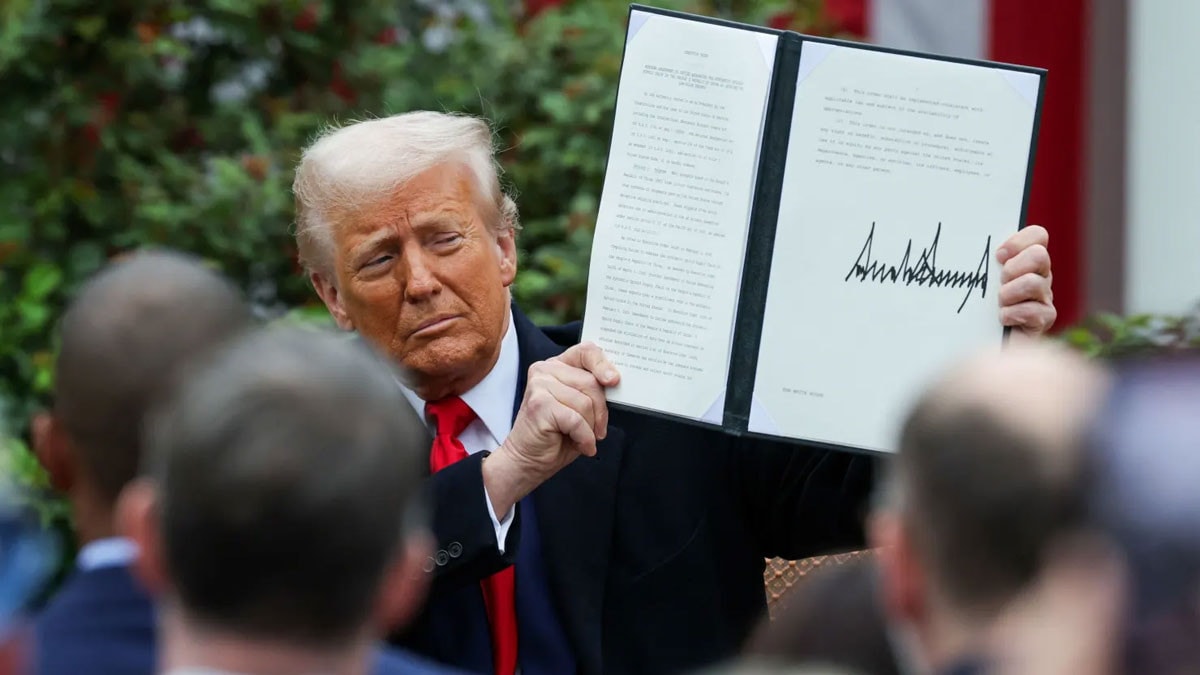Countervailing duties explained in simple terms.
Reciprocal tariffs are understood as tariffs that are mutually beneficial, meaning that one country applies an import tariff rate corresponding to the tariff rate that the exporting country applies to its goods.
For example, if the US imposes a 10% tariff on goods from Vietnam, Vietnam could impose a 10% tariff on goods from the US to ensure fairness in trade.

This term has appeared frequently in the context of international trade policy, particularly since February 13, 2025, when Trump signed an executive order requiring the development of a reciprocal tariff plan to "ensure fairness in trade." The goal is to reduce the US trade deficit and protect American workers, but it also raises concerns about disruption to global trade.
The impact of reciprocal tariffs on the market.
Reciprocal tariffs could have far-reaching effects on markets, based on recent economic analyses:
Reciprocal tariffs, such as the 25% tariffs on Canada and Mexico, could reduce the long-term US GDP by 0.2%, result in the loss of 223,000 full-time jobs, and decrease average after-tax income by 0.6%, not to mention retaliation from other countries. This highlights the risk of reduced global trade, especially if countries like China and the EU retaliate.
Reciprocal tariffs, as high as 54% on China, would increase the price of imported goods, impacting American consumers and businesses dependent on global supply chains. S&P Global Ratings estimates that US consumer prices could rise 0.7% if the tariffs are fully implemented.
Logistics sectors such as shipping are concerned about reduced demand due to the trade war. Companies like Maersk and MSC may face higher costs due to supply chain disruptions.
Reciprocal tariffs could trigger a US economic recession and slow global growth, reminiscent of the Smoot-Hawley Act of 1930, which led to the Great Depression.
The specific impact of reciprocal tariffs on Vietnam.
Vietnam, as one of the major trading partners of the United States, will be affected by the retaliatory tariff policy:
Vietnam exports many goods to the US, such as textiles, footwear, and electronics. If the US imposes high tariffs, the price of Vietnamese goods will increase, reducing their competitiveness.
Mr. Do Ngoc Hung, Vietnam's Trade Representative in the US, stated that this policy targets not only tariffs but also non-tariff barriers, making negotiations difficult.
During a meeting with US Ambassador Marc E. Knapper, Minister Nguyen Hong Dien emphasized the complementary nature of the two economies, and the US Ambassador affirmed that the recent tariff measures were not aimed at Vietnam, but rather at maintaining positive relations.
Ms. Tran Thi Khanh Hien, Director of Research at MB Securities, believes that Vietnam will be affected, but Trump may prioritize major partners first, and cooperating countries like Japan will face less pressure than in his previous term.

Positive and negative impacts of reciprocal tariffs
| Element | Positive Impact | Negative Impact |
|---|---|---|
| Commodity Prices | Protecting domestic industries from low-price competition. | Rising import prices affect consumers. |
| Global Trade | Encourage negotiations for tax reductions. | Reduced trade volume, risk of trade war. |
| Industry | Domestic manufacturing industry receives support. | The raw material export and import sectors have been affected. |
| Economic Growth | Protecting jobs in the short term. | Reduced long-term growth due to higher costs. |
| Vietnam Specifically | Maintain positive trade relations. | Exports to the US may decrease due to non-tariff barriers. |
Reciprocal tariffs, or reciprocal tariffs, are a trade tool aimed at ensuring fairness, but they present both opportunities and challenges. For Vietnam, being affected is unavoidable, especially in exports, but diplomatic efforts and negotiations can mitigate negative impacts. Consumers and businesses need to closely monitor new policies, particularly from the US, to adjust their business strategies.
Source: https://baonghean.vn/thue-quan-doi-ung-la-gi-tac-dong-tich-cuc-va-tieu-cuc-cua-thue-doi-ung-10294327.html





![[Photo] Prime Minister Pham Minh Chinh presides over a meeting on private sector economic development.](/_next/image?url=https%3A%2F%2Fvphoto.vietnam.vn%2Fthumb%2F1200x675%2Fvietnam%2Fresource%2FIMAGE%2F2025%2F12%2F20%2F1766237501876_thiet-ke-chua-co-ten-40-png.webp&w=3840&q=75)


































































































Comment (0)